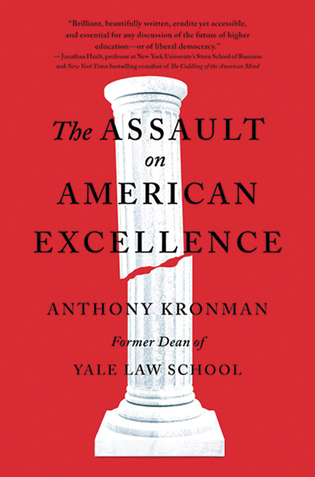 loading
loading
Arts & CultureReviews: September/October 2019A former Law School dean critiques campus politics; a historical novel about Finns in the Pacific Northwest; a deep dive into mass incarceration and criminal justice reform.  View full imageThe Assault on American Excellence Molly Worthen ’03, ’11PhD, is an associate professor of history at the University of North Carolina–Chapel Hill. Anthony Kronman, former dean of Yale Law School, is fighting for aristocracy—and not the kind made up of gouty men in brocade and powdered wigs, or Wall Street executives in bespoke suits. He believes in the “the rule of the best” as America’s top universities have long defined it: an unabashed elitism that elevates “character, wisdom, and excellence” over the pursuit of wealth and power. Now, that commitment has come under threat. Kronman’s “aristocracy of truth-seekers” is, in theory, open to anyone who strives for “excellence in human living, as distinct from vocational success.” He is provocatively vague about how aristocratic souls ascend to a higher level of moral wisdom and so gain “a greater quantum of being.” In his book Confessions of a Born-Again Pagan, he described his secularized vision of discipleship in great detail. It requires reading widely in the humanistic tradition of great thinkers who have wrestled with life’s big questions, in order to refine an open mind and an ability to live with uncomfortable ambiguities—and it should be central to a university’s mission. Although Kronman may romanticize the educational ideals of days gone by, he is right that things have changed. Over the past 40 years, the fixation on employable “skills” has swelled, and the noble desire to rectify social injustice and widen educational access has mutated into a bureaucratized and weaponized strain of left-wing politics. He is not a political conservative: he dropped out of college to work for Students for a Democratic Society. He favors explicit admissions quotas based on race as part of a “program of reparative justice,” rather than the system we have now: hidden quotas, cloaked in the rhetoric of diversity. Kronman worries that this “climate of mendacity” encourages students to embrace fixed group identities, rather than to cultivate their own worldviews as individuals. Many readers will dispute Kronman’s critique of campus politics, particularly his defense of radioactive historical monuments. He lambastes Yale’s decision to rename Calhoun College (“short of a statue to Hitler, removal or renaming is never justified”). But his discussion of free speech is an essential guide for all who work in higher education today. A seminar discussion is not a debate, not a therapy session, but “a joint enterprise” in which students and teachers seek truth by collaborating “in the production of something whose authorship they share.” Participants must ground their claims in evidence accessible to everyone, regardless of their identity group. Subjective feelings must never become “a trump,” “immunized from criticism, or even inspection, because they are essentially private”—no matter who you are. At its best, this “conversational ideal” is the democratic gateway to Kronman’s aristocracy of excellence.
|
|